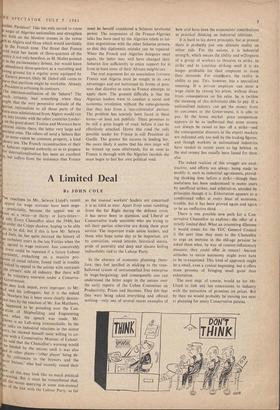A Limited Deal
By JOHN COLE HE reactions to Mr. Selwyn Lloyd's recent appeal for wage restraint have been nega- -predictably, because the appeal was as toils as a twice—or thirty- or forty-times- tale. Every Chancellor since the 1940s has d under the Cripps shadow, hoping to be able 0 as he did; but if this is how Mr. Selwyn yd feels, he has quite misread the history of e turbulent years in the late Forties when the C agreed to wage restraint. Just conceivably event could be repeated if a future Labour ernment, embarking on a massive pro- me of social reform, found itself in trouble linked its appeal to the unions with restraints the owners', side of industry. But there will r be voluntary restraint under a Conserva- Government. his may look unjust, even improper, to Mr. cl and his colleagues, but it is the naked h. Nowhere has it been more clearly demon- ted than by the reaction of Mr. Jim Matthews, happened to be presiding over the Con- ration of Shipbuilding and Engineering ons when the speech was made. Mr. thews is no Left-wing irreconcilable. In the nt talks on industrial relations in the motor strY, he showed himself most willing to co- ate with a Conservative Minister of Labour. he said that the Chancellor's warning would be heeded by the unions until it was also ed in other places—'other places' being de- by references to the brewers and the cco barons,' who had recently raised their S.
OW, all this may look like so much political t-scoring. But it must be remembered that, all the recent querying in some non-manual ns of the link with the Labour Party, as far as the manual workers' leaders are concerned it is as solid as ever. Apart from some rumbling from the far Right during the defence crisis, it has never been in question, and ' Liberal or Conservative trade unionists who are trying to tell their parties otherwise are doing them poor service. The important trade union leaders, and those who hope some day to be important, are by conviction, vested interest, historical inertia, pride of paternity and deep and sincere feeling indissolubly tied to the Labour Party.
In the absence of economic planning, there- fore, they feel justified in sticking to the time- hallowed system of untrammelled free enterprise in wage-bargaining; and consequently one can understand the bitter anger in the unions over the early reports of the Cohen Committee on Productivity, Prices and Incomes. They felt that they were being asked everything and offered nothing—only one of several recent examples of how arid have been the economists' contributions to practical thinking on industrial relations.
It is hard to lay down principles, but at present there is probably just one ultimate reality on either side. For the • unions. it is industrial strength; which means the 'ability and willingness of a group of workers to threaten to strike, to strike and to continue striking until it is no longer profitable for their employer to resist their demands. For emplbyers, the reality is ability to pay. This. however, has a specialised meaning. If a private employer can meet a wage claim by raising his prices, without disas- trous consequences on his sales, he is (within the meaning of this definition) able to pay. If a nationalised industry can get the money from its customers or the Government, it is able to pay. In the home market,, price competition appears to be so ineffectual that some money can always be raised to buy off a strike—and the consequential disasters in the export markets are indicated only too well by the trading figures; and though workers in nationalised industries have tended in recent years to lag behind, in the end money has usually been found for them also The naked realities of this struggle are unat. tractive, and efforts are alwar, being made to modify it, such as industrial agrvements, provid- ing thinking time before a strik'z—though their usefulness has been undermined qr recent years by unofficial strikes; and arbitration, unaided by principles though it is. Exhortation appears as a conditioned reflex at every ,blast of economic trouble, but it has been proved again and again to be an ineffective third.
There is one possible new path for a Con. servative Chancellor to explore: the offer of a strictly limited deal. What an interesting dilemma it would create, for the TUC Genensl Council it the next time they went to the Chancellor to urge an increase in the old-age pension he asked them what, by way of counter-inflationary • measure, they could offer in return! Ancient attitudes to union autonomy might even have to be re-examined. This kind of approach might be a small, even a cynical beginning; but it offers more promise of bringing small gains than exhortation.
The next step, of course, would be for Mr. Lloyd to link any tax concessions to industry with the extraction of promises on prices. Biat by then we would probably be' moving too near to planning for many Conservative palates. •


























































 Previous page
Previous page